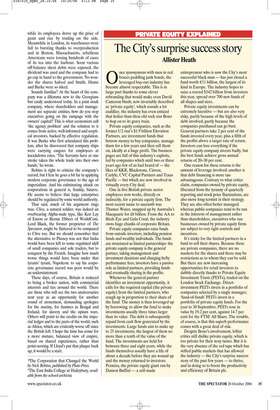The City’s surprise success story
Allister Heath
Once synonymous with men in red braces peddling junk bonds, the leveraged buy-out industry has become almost respectable. This is in large part thanks to some clever rebranding that would make even David Cameron blush; now invariably described as ‘private equity’, which sounds a lot cuddlier, the industry has even enticed that holier-than-thou old rock star Bono to hop on to its gravy train.
Private equity companies, such as the former U2 star’s $1.9 billion Elevation Partners, are investment funds that borrow money to buy companies, manage them for a few years and then sell them on, ideally at a huge profit. The business pages are full of this industry’s exploits, led by companies which until two or three years ago few of us had heard of — the likes of KKR, Blackstone, Cinven, Carlyle, CVC Capital Partners and Texas Pacific — but which are now involved in virtually every City deal.
One in five British private sector employees now works, directly or indirectly, for a private equity firm. The most recent name to succumb was Thames Water, snapped up by Australia’s Macquarie for £8 billion. From the AA to Birds Eye and Gala Coral, the industry owns huge chunks of corporate Britain.
Private equity companies raise funds from outside investors, including pension funds and wealthy individuals. The funds are structured as limited partnerships: the private equity company is the general partner, taking management and investment decisions and charging hefty performance fees; investors have a passive role as limited partners, providing funds and eventually sharing in the profits.
Whenever the general partner identifies an investment opportunity, it calls for the required capital (the private equity) from the limited partners, who cough up in proportion to their share of the fund. The money is then leveraged up by borrowing, to allow the fund to make investments usually three times larger than its value. The debt is subsequently repaid from cash flow generated by the investments. Large funds aim to make up to 25 investments, the largest of them no more than a tenth of the value of the fund. The investments are held for between three and eight years, while the funds themselves usually have a life of about a decade before they are wound up and the money returned to investors. Permira, the private equity giant run by Damon Buffini — a self-made entrepreneur who is now the City’s most successful black man — has just closed a fund worth €11 billion, the largest of its kind in Europe. The industry hopes to raise a record $342 billion from investors this year, spread over 700 new funds of all shapes and sizes.
Private equity investments can be extremely lucrative — but are also very risky, partly because of the high levels of debt involved, partly because the companies purchased can go bust. General partners take 2 per cent of the funds invested every year, plus a fifth of the profits above a target rate of return. Investors can lose everything if the private equity company invests badly, but the best funds achieve gross annual returns of 20–30 per cent.
One reason for these returns is the amount of leverage involved; another is that debt financing is more taxadvantageous. Contrary to what critics claim, companies owned by private equity, liberated from the tyranny of quarterly reporting and stock price fluctuations, are also more long-termist in their strategy. They are also often better managed: whereas public companies tend to be run in the interests of management rather than shareholders, executives who run businesses owned by private equity firms are subject to very tight controls and incentives.
It’s tricky for the limited partners in a fund to sell their shares. Because these are private companies, there are no markets for the shares and there may be restrictions as to whom they can be sold. But there are now increasing opportunities for retail investors to dabble directly thanks to Private Equity Investment Trusts (PEITs), traded on the London Stock Exchange. Directinvestment PEITs invest in a portfolio of companies selected by a single manager; ‘fund-of-funds’ PEITs invest in a portfolio of private equity funds. For the year to 30 September, PEITs rose in value by 19.2 per cent, against 14.7 per cent for the FTSE All Share. The trouble, of course, is that this superb performance comes with a great deal of risk.
Despite Bono’s involvement, leftist critics still dislike private equity, which is too private for their nosy tastes. But it is the very absence of the red tape which has stifled public markets that has allowed the industry — the City’s surprise success story of the past few years — to thrive, and in doing so to boost the productivity and efficiency of Britain plc.


























































































 Previous page
Previous page